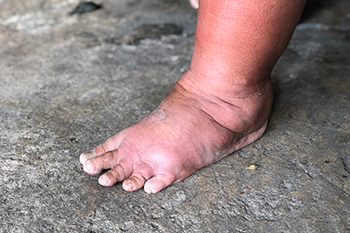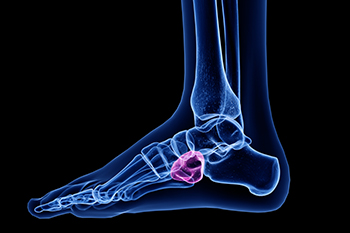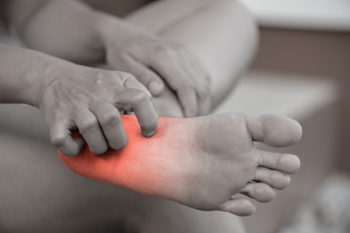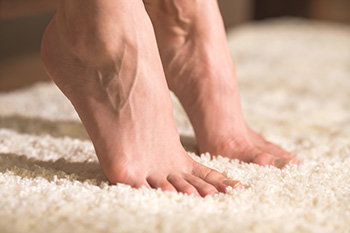Items filtered by date: April 2023
Swelling and Salt Intake

Salt is a mineral that is familiar to the vast majority of Americans. Countless different people around the country choose to flavor their food by sprinkling salt on it almost every day. However, excessive salt intake can have potentially negative consequences for the feet. Specifically, when an individual eats too much salt, their ankles can effectively swell up because of increased water retention. Therefore, before eating too much salt, someone who is experiencing swollen feet might be more hesitant to increase their salt intake. If you are living with persistently swollen ankles, it is highly suggested that you schedule an appointment with a podiatrist today who can answer any questions you might have and provide treatment.
Swollen feet can be a sign of an underlying condition. If you have any concerns, contact one of our podiatrists of Quad Cities Foot and Ankle Associates. Our doctors can provide the care you need to keep you pain-free and on your feet.
Swollen feet are a common ailment among pregnant women and people who stand or sit for extended periods. Aging may increase the possibility of swollen feet and patients who are obese often notice when their feet are swelling too. There may be medical reasons why swollen feet occur:
- Phlebitis - A condition that causes the veins to become inflamed and can also cause leg pain.
- Liver disease - This may lead to low blood levels of albumin which is a protein. This can cause fluid in the blood to pass into the tissues and several areas of the body can become swollen.
- Heart failure - When the heart doesn’t pump properly the blood that is normally pumped back to the heart can pool in the veins of the legs causing swollen feet.
- Kidney disease - One of the main functions of the kidneys is releasing excess fluid in the body. This type of condition can make it difficult for the kidneys to function properly, and as a result the feet may become swollen.
- Deep-vein thrombosis (DVT)- This is a serious condition where blood clots form in the veins of the legs. They can block the return of blood from the legs to the heart which may cause the feet to swell. It is important to be treated by a podiatrist if this condition is present.
Swollen feet can also be caused by bone and tendon conditions, including fractures, arthritis, and tendinitis. Additionally, there may be skin and toenail conditions and an infection may cause the feet to swell. Patients who take medicine to treat high blood pressure may be prone to getting swollen feet.
Many patients elevate their feet to help relieve the swelling and this is generally a temporary remedy. When a podiatrist is consulted the reason behind the swelling can be uncovered and subsequently treated.
If you have any questions please feel free to contact our offices located in Bettendorf, and DeWitt, IA and Rock Island, IL . We offer the newest diagnostic tools and technology to treat your foot and ankle needs.
Are Bunions Affecting Your Everyday Life?
Active People May Be Prone to Getting Cuboid Syndrome

There is a bone in the foot known as the cuboid bone. An injury may cause this bone to shift out of alignment, possibly causing cuboid syndrome to develop. The pain is generally felt on the outer edge of the foot and can be a common injury among dancers and athletes. Usual symptoms that are often experienced with cuboid syndrome can include difficulty in bearing weight on the foot, a reduced range of motion, and the foot may be swollen. Additionally, the pain may begin as a dull ache and gradually sharpen, increasing discomfort on the overall foot. People with flat feet may experience this condition, or it may come from those who frequently engage in running and jumping activities. Mild relief may be found when the affected foot is elevated and the activity that caused the injury is temporarily stopped. If you have pain in this part of your foot, it is suggested that you confer with a podiatrist who can effectively diagnose and treat cuboid syndrome.
Cuboid syndrome, also known as cuboid subluxation, occurs when the joints and ligaments near the cuboid bone in the foot become torn. If you have cuboid syndrome, consult with one of our podiatrists from Quad Cities Foot and Ankle Associates. Our doctors will assess your condition and provide you with quality foot and ankle treatment.
Cuboid syndrome is a common cause of lateral foot pain, which is pain on the outside of the foot. The condition may happen suddenly due to an ankle sprain, or it may develop slowly overtime from repetitive tension through the bone and surrounding structures.
Causes
The most common causes of cuboid syndrome include:
- Injury – The most common cause of this ailment is an ankle sprain.
- Repetitive Strain – Tension placed through the peroneus longus muscle from repetitive activities such as jumping and running may cause excessive traction on the bone causing it to sublux.
- Altered Foot Biomechanics – Most people suffering from cuboid subluxation have flat feet.
Symptoms
A common symptom of cuboid syndrome is pain along the outside of the foot which can be felt in the ankle and toes. This pain may create walking difficulties and may cause those with the condition to walk with a limp.
Diagnosis
Diagnosis of cuboid syndrome is often difficult, and it is often misdiagnosed. X-rays, MRIs and CT scans often fail to properly show the cuboid subluxation. Although there isn’t a specific test used to diagnose cuboid syndrome, your podiatrist will usually check if pain is felt while pressing firmly on the cuboid bone of your foot.
Treatment
Just as the range of causes varies widely, so do treatments. Some more common treatments are ice therapy, rest, exercise, taping, and orthotics.
If you have any questions, please feel free to contact our offices located in Bettendorf, and DeWitt, IA and Rock Island, IL . We offer the newest diagnostic and treatment technologies for all your foot care needs.
Diabetes and Neuropathy

Neuropathy is nerve damage. It is a common condition among diabetic patients, which can happen as a result of elevated glucose levels in the blood. Recent studies have shown that about 60 percent of neuropathy cases in the United States are linked to diabetes. The feet are often affected, and the inability to feel existing cuts and scrapes may lead to developing a foot ulcer. The symptoms that often accompany this condition can include a numbing or tingling sensation, and the muscles can feel weak. Developing neuropathy may also be connected to chronic alcoholism, HIV, or AIDS, and there are cancer patients that may have this condition. A deficiency of vitamins B12 or A may cause neuropathy to occur, in addition to eating foods that have toxins. A diagnosis is generally needed to confirm this condition, which consists of having a blood test taken or possibly a skin biopsy performed. If you have numbness in your feet, it is suggested that you contact a podiatrist as quickly as possible who can properly diagnose and treat neuropathy.
Neuropathy
Neuropathy can be a potentially serious condition, especially if it is left undiagnosed. If you have any concerns that you may be experiencing nerve loss in your feet, consult with one of our podiatrists from Quad Cities Foot and Ankle Associates. Our doctors will assess your condition and provide you with quality foot and ankle treatment for neuropathy.
What Is Neuropathy?
Neuropathy is a condition that leads to damage to the nerves in the body. Peripheral neuropathy, or neuropathy that affects your peripheral nervous system, usually occurs in the feet. Neuropathy can be triggered by a number of different causes. Such causes include diabetes, infections, cancers, disorders, and toxic substances.
Symptoms of Neuropathy Include:
- Numbness
- Sensation loss
- Prickling and tingling sensations
- Throbbing, freezing, burning pains
- Muscle weakness
Those with diabetes are at serious risk due to being unable to feel an ulcer on their feet. Diabetics usually also suffer from poor blood circulation. This can lead to the wound not healing, infections occurring, and the limb may have to be amputated.
Treatment
To treat neuropathy in the foot, podiatrists will first diagnose the cause of the neuropathy. Figuring out the underlying cause of the neuropathy will allow the podiatrist to prescribe the best treatment, whether it be caused by diabetes, toxic substance exposure, infection, etc. If the nerve has not died, then it’s possible that sensation may be able to return to the foot.
Pain medication may be issued for pain. Electrical nerve stimulation can be used to stimulate nerves. If the neuropathy is caused from pressure on the nerves, then surgery may be necessary.
If you have any questions, please feel free to contact our offices located in Bettendorf, and DeWitt, IA and Rock Island, IL . We offer the newest diagnostic and treatment technologies for all your foot care needs.
Exercise and Stronger Feet

Exercising the feet regularly is a good way to keep them healthy and strong. An effective toe stretch is done by sitting in a chair with the feet on the floor. Raising the heels while keeping the toes on the floor, followed by reversing the order can be successful in stretching the feet. Each position can be repeated several times until a good stretch is felt. A toe splay is done when the heels remain on the floor with the toes spread apart. This can be repeated up to ten times. The sole can be strengthened by crossing one leg over the opposite knee and pulling the toes back toward the shin. There are numerous stretches and foot exercises that are easy to perform. If you would like additional information about exercising your feet, it is suggested that you confer with a podiatrist who can guide you in having stronger feet.
Exercising your feet regularly with the proper foot wear is a great way to prevent injuries and build strength. If you have any concerns about your feet, contact one of our podiatrists from Quad Cities Foot and Ankle Associates. Our doctors can provide the care you need to keep you pain-free and on your feet.
Exercise for Your Feet
Exercise for your feet can help you gain strength, mobility and flexibility in your feet. They say that strengthening your feet can be just as rewarding as strengthening another part of the body. Your feet are very important, and we often forget about them in our daily tasks. But it is because of our feet that are we able to get going and do what we need to. For those of us fortunate enough to not have any foot problems, it is an important gesture to take care of them to ensure good health in the long run.
Some foot health exercises can include ankle pumps, tip-toeing, toe rises, lifting off the floor doing reps and sets, and flexing the toes. It is best to speak with Our doctors to determine an appropriate regimen for your needs. Everyone’s needs and bodies are different, and the activities required to maintain strength in the feet vary from individual to individual.
Once you get into a routine of doing regular exercise, you may notice a difference in your feet and how strong they may become.
If you have any questions please feel free to contact our offices located in Bettendorf, and DeWitt, IA and Rock Island, IL . We offer the newest diagnostic and treatment technologies for all your foot and ankle needs.

